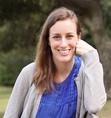Dallas Woodburn's Blog, page 19
August 20, 2011
Call for Submissions from Young Writers: Crashtest
If you are a teenager currently enrolled in high school, grades 9-12, Crashtest, the new online literary magazine for high school writers, would like to hear from you!
Crashtest publishes poetry, stories and creative non-fiction in the form of personal essays, imaginative investigation, experimental interviews, or whatever else you would like to call it. We're looking for writing that has both a perspective and a personality. We're looking for authors who have something to say. Check us out at www.crashtestmag.com.
Guidelines: Crashtest only accepts email submissions. Send submissions, in the form of a .doc or .rtf attachment only, and any queries to (replace (at) with @ when sending e-mail.)
Poetry: 3-5 poems at a time.
Fiction: 1 piece at a time (no word or page limit)
Creative Non-Fiction: 1 piece at a time (no word or page limit)
Please go to www.crashtestmag.com for complete guidelines.Dallas Woodburn
author, speaker, freelance writer
founder of Write On! Books and Write On! For Literacy
www.writeonbooks.org
http://dallaswoodburn.blogspot.com/
Crashtest publishes poetry, stories and creative non-fiction in the form of personal essays, imaginative investigation, experimental interviews, or whatever else you would like to call it. We're looking for writing that has both a perspective and a personality. We're looking for authors who have something to say. Check us out at www.crashtestmag.com.
Guidelines: Crashtest only accepts email submissions. Send submissions, in the form of a .doc or .rtf attachment only, and any queries to (replace (at) with @ when sending e-mail.)
Poetry: 3-5 poems at a time.
Fiction: 1 piece at a time (no word or page limit)
Creative Non-Fiction: 1 piece at a time (no word or page limit)
Please go to www.crashtestmag.com for complete guidelines.Dallas Woodburn
author, speaker, freelance writer
founder of Write On! Books and Write On! For Literacy
www.writeonbooks.org
http://dallaswoodburn.blogspot.com/
Published on August 20, 2011 05:26
August 19, 2011
Interview with Young Author Corinne Fombelle
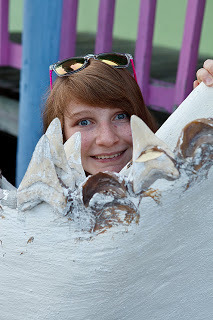 At just thirteen years old, Corinne Fombelle published her 245-page novel Below the Surface, which she describes as "a novel about a girl and her best friend who wind up in a wild ocean adventure full of sharks, dolphins, fun, and surprises." The book is available as a Kindle download. Read on for Corinne's inspirational interview!
At just thirteen years old, Corinne Fombelle published her 245-page novel Below the Surface, which she describes as "a novel about a girl and her best friend who wind up in a wild ocean adventure full of sharks, dolphins, fun, and surprises." The book is available as a Kindle download. Read on for Corinne's inspirational interview! How did you get the idea for Below the Surface?
I decided I wanted to write a book, and I was trying to come up with something. I remember looking around the room trying to come up with a random idea. I saw a picture of a boat on the water and imagined something big going on underwater. That's when I first got the basic idea, and it just snowballed from there.
What made you first interested in writing?
In the fifth grade, when I was ten years old, my teacher Mrs. O'Brien gave us a creative writing assignment. It wasn't anything crazy, just a few short pages would do. So I wrote my little story for class and ended up really enjoying it. After I had turned it in, I decided to write a longer story, more like a book.
What is your writing routine?
When I was writing Below the Surface, I would go on our desktop computer in the basement about every day and type. My family didn't even really realize the extent of my project until I told them it was finished. I asked my mom if she would print it for me. I would always just call it "my story" so they assumed that it wasn't much longer than the one I had written for class. She told me that when she went to print it, the printer ran out of paper, and she was so surprised. That was when she realized that I had really written a book at the age of ten. I just liked writing so much that I would go and work on it nearly every day.
What do you like about writing?
My favorite thing about writing is probably that there aren't really any restrictions. You can take it wherever you want and think of anything that pops into your head and weave it into an entire plot.
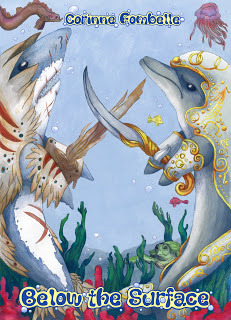 How do you deal with disappointment and rejection?
How do you deal with disappointment and rejection?As a writer, there are many times you get turned down. The biggest problem I faced was my age. To get a book published with a real company, you need to get an agent or they won't listen to you regardless. But I also think it's hard to make agents pay attention if you're under eighteen. When I finally realized that there wasn't a way to get agents to read my manuscript, I tried to find another way to get my book published, which was my ultimate goal from the time I finished it. I did many revisions and tweaked lots of things, just to get it that much better while I was trying to find another way to get the public to read my work. Finally, my uncle sent me an email about Kindle publishing, and how it was a great opportunity. I looked into it, and found out that there was no down side, and went through with it. Basically, I just always try to find a way to make things work out.
What is your biggest advice for a young person going after their dreams?
I would tell anyone who wants to get into writing or anything else that they should do the best they can to perfect their skills at whatever it is they're doing, and then things will just work out. If you're put a lot of work into something, people will notice and try to help you reach your goal.
Is there anything else you'd like to add?
I finished Below the Surface when I was ten and didn't get it published until I was thirteen. I never gave up on it. I didn't quit. I still was working on it even further and fixing little things in the story. I was still trying to find a way to make it happen, and finally my uncle gave me the last boost I needed, the information about Kindle publishing. If I hadn't still been editing the book and trying to make it better yet, I wouldn't have been told about Kindle publishing because I would have probably stopped writing. So, even if you face disappointments that seem to stop you, keep trying and always keep the things in your life that make you happy, and they will someday benefit you because of your passion for it.Dallas Woodburn
author, speaker, freelance writer
founder of Write On! Books and Write On! For Literacy
www.writeonbooks.org
http://dallaswoodburn.blogspot.com/
Published on August 19, 2011 05:03
August 12, 2011
Interview with Robert-Harry Rovin, writing teacher to the homeless
A few weeks ago I was introduced to an amazing fellow writer, writing teacher, and literacy advocate named Robert-Harry Rovin. (Thanks to the wonderful Ilene Dillon, host of the Emotional Pro radio show, for making the introduction.) Robert-Harry leads a writing workshop for the homeless, coincidentally also called W R I T E O N, which proves that great minds do think alike! :) He was kind enough to visit the blog today to speak about the empowerment and hope that writing can bring into people's lives.
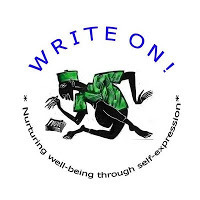 What would you like readers to know about you as an introduction?
What would you like readers to know about you as an introduction?
I have a background of professional acting, singing and dancing in New York City and studies in Continuum with Emile Conrad, then teaching her work. I practiced Rosen Method Bodywork for twenty years and was a member of an Authentic Movement group for many years. Also for many years I've offered a program of the lyric poetry of nature as Green Man Alive as well as Yertl the Turtle and The Lorax for children portraying this archetypal character. Eleven years ago I enrolled as a student in Ridhwan's Diamond Approach, a somatically based inquiry and meditation practice of self realization, which continues to be a strong foundation for my life.
Tell us about how the Write On! Workshops began.
Eight years ago I started a creative writing program for homeless people called W R I T E O N ! I had been working in a homeless shelter for years and felt that the depersonalization that results from people being enmeshed in the social service system was not being dealt with. I started offering creative writing classes to support people's connection to their deeper selves and to nourish their well-being through self-expression. I combined the inquiry and meditation methods of the Diamond Approach with creative writing.
What have you learned through creating this program?
The creative work that has come forward also helps shift social perceptions: through the eyes of those more comfortably ensconced, the homeless can now be seen as creative individuals of worth rather than faceless abstractions; and in turn these souls without homes are supported in their ability to relate to the more affluent on a level where creativity and truth of expression are a shared experience.
I've been so moved watching people come alive as they discover and articulate their personal truth through prose and poetry. This aliveness has translated into all of us finding our deeper, more authentic voices as well as homeless people having more confidence and more success in advocating for a home, good health and work.
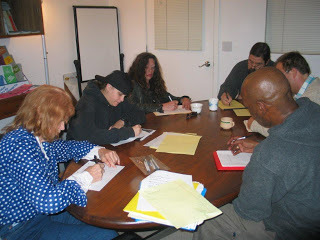
In your opinion, why is writing so important?
Writing provides an opportunity to give language to sensation, feeling and thought. Once articulated onto the page, this material is available for reflection and makes room for the next wave of truth telling to appear. Additionally, in W R I T E O N ! workshops the writers have the opportunity to read what they've written, then to receive only positive reflection of their writing, which further affirms the validity of their expression.
What is your writing process like?
In the workshops as well as at home or around and about, I write in a composition book with a black and white marbleized cardboard cover. Writings I wish to preserve I copy into my laptop. Occasionally I draw illustrations or elaborate doodles to accompany my poems, stories and essays.
Does teaching these workshops influence your own writing?
Extending unconditional acceptance to the writers in the workshops has had the affect of extending that affirming support to my own creative process, including writing.
What is your biggest advice for young people reaching for their dreams?
For young people, I would advise them to feel what part of their dream is most alive to them and to focus on following that aspect first; the rest will follow.
What are some of your favorite books?
Favorite books include Mary Oliver's New and Selected Poems and Writing Alone or With Others by Pat Schneider. Right now I'm enjoying Speak Peace in a World of Conflict by Marshall B. Rosenberg, Ph.D; Wisdom Jesus by Cynthia Bourgeault; and Working in the Dark by Jimmy Santiago Boca.
Is there anything else you would like to add?
W R I T E O N ! presents public readings of creative writing and also has an internet radio program (www.blogradio.com) where people share their creative work. Type in robert-harryrovin at their web site to select an archived episode; or Google "Robert-Harry Rovin" to arrive at the W R I T E O N ! page on the same web site. Check out some of our participant's writings on the blog at www.writeonworkshops.orgDallas Woodburn
author, speaker, freelance writer
founder of Write On! Books and Write On! For Literacy
www.writeonbooks.org
http://dallaswoodburn.blogspot.com/
 What would you like readers to know about you as an introduction?
What would you like readers to know about you as an introduction?I have a background of professional acting, singing and dancing in New York City and studies in Continuum with Emile Conrad, then teaching her work. I practiced Rosen Method Bodywork for twenty years and was a member of an Authentic Movement group for many years. Also for many years I've offered a program of the lyric poetry of nature as Green Man Alive as well as Yertl the Turtle and The Lorax for children portraying this archetypal character. Eleven years ago I enrolled as a student in Ridhwan's Diamond Approach, a somatically based inquiry and meditation practice of self realization, which continues to be a strong foundation for my life.
Tell us about how the Write On! Workshops began.
Eight years ago I started a creative writing program for homeless people called W R I T E O N ! I had been working in a homeless shelter for years and felt that the depersonalization that results from people being enmeshed in the social service system was not being dealt with. I started offering creative writing classes to support people's connection to their deeper selves and to nourish their well-being through self-expression. I combined the inquiry and meditation methods of the Diamond Approach with creative writing.
What have you learned through creating this program?
The creative work that has come forward also helps shift social perceptions: through the eyes of those more comfortably ensconced, the homeless can now be seen as creative individuals of worth rather than faceless abstractions; and in turn these souls without homes are supported in their ability to relate to the more affluent on a level where creativity and truth of expression are a shared experience.
I've been so moved watching people come alive as they discover and articulate their personal truth through prose and poetry. This aliveness has translated into all of us finding our deeper, more authentic voices as well as homeless people having more confidence and more success in advocating for a home, good health and work.

In your opinion, why is writing so important?
Writing provides an opportunity to give language to sensation, feeling and thought. Once articulated onto the page, this material is available for reflection and makes room for the next wave of truth telling to appear. Additionally, in W R I T E O N ! workshops the writers have the opportunity to read what they've written, then to receive only positive reflection of their writing, which further affirms the validity of their expression.
What is your writing process like?
In the workshops as well as at home or around and about, I write in a composition book with a black and white marbleized cardboard cover. Writings I wish to preserve I copy into my laptop. Occasionally I draw illustrations or elaborate doodles to accompany my poems, stories and essays.
Does teaching these workshops influence your own writing?
Extending unconditional acceptance to the writers in the workshops has had the affect of extending that affirming support to my own creative process, including writing.
What is your biggest advice for young people reaching for their dreams?
For young people, I would advise them to feel what part of their dream is most alive to them and to focus on following that aspect first; the rest will follow.
What are some of your favorite books?
Favorite books include Mary Oliver's New and Selected Poems and Writing Alone or With Others by Pat Schneider. Right now I'm enjoying Speak Peace in a World of Conflict by Marshall B. Rosenberg, Ph.D; Wisdom Jesus by Cynthia Bourgeault; and Working in the Dark by Jimmy Santiago Boca.
Is there anything else you would like to add?
W R I T E O N ! presents public readings of creative writing and also has an internet radio program (www.blogradio.com) where people share their creative work. Type in robert-harryrovin at their web site to select an archived episode; or Google "Robert-Harry Rovin" to arrive at the W R I T E O N ! page on the same web site. Check out some of our participant's writings on the blog at www.writeonworkshops.orgDallas Woodburn
author, speaker, freelance writer
founder of Write On! Books and Write On! For Literacy
www.writeonbooks.org
http://dallaswoodburn.blogspot.com/
Published on August 12, 2011 07:58
August 9, 2011
Part II: Interview with Alan Sitomer, award-winning author of NERD GIRLS
Today I am delighted to continue our Write On! interview with award-winning author and California 2007 Teacher of the Year Alan Sitomer. His latest book, Nerd Girls, is available on Amazon here.
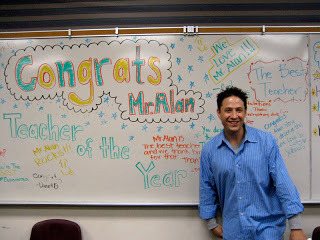
Besides being an author, you are an award-winning teacher. How does teaching influence your writing and the creation of your material?
I show all of my books to real kids first. My students, former students, fans I have gotten to know from around the country, they all get to check out my books hot off the press before anyone else gets a chance to see them. That means before my literary agent. That means before my editor. That means before anyone in the adult world who works in "the publishing industry." Real kids are my readers and if they don't like something – if they don't laugh, if they don't cry, if they don't approve – then it doesn't really matter what the adults think.
Kids are my best, and toughest audience. If my books flies with them, then I know I am good and I'll go ahead and take it to the next level and begin to show it to the people in the publishing industry. But if I do not get their seal of approval, I stop, listen to their feedback and go back into the piece to go make it work. It's probably why my fans are so loyal; they know that I respect them and I listen to them and I like them.
Kids who read my books can know that other kids have read them first and given the "Thumbs Up!" sign. I really think that is an important element to my work.
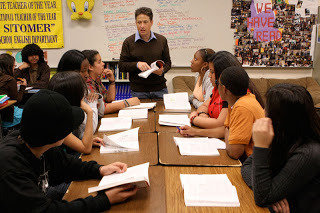
You often talk about "puttin' the fun" in reading, writing and school. Why?
Let's be honest: sometimes school can get SO BORING! And there's no reason for it. But still, grumpy adults sometimes send the message to kids that life is to be serious, serious, serious and humorless, humorless, humorless.
To them I say BLAAAAHHH!
Students are at their best when they are enjoying what they are doing. Students will read more books when they like what they are reading. Students will learn more about a subject when they like what they are learning. Students will try harder to do a good job on the work they are being asked to do if they like the work that they are doing.
That's my belief and I am sticking with it. (Besides, I was named California Teacher of the Year so ya might think I know just a wee little bit about this stuff, huh?)
Of course, there is a time to be serious. But being serious does not mean that you can't enjoy yourself. Of course kids have to realize that there are some things in life you just have to do - and do well - even if they are not "fun." I get that. It's called reality and the bigger point of school is not to be entertaining. But for the most part I've found it's actually quite satisfying to work really, really hard on something that challenges you deeply. Finding the joy in the challenge is what brings out the best in us.
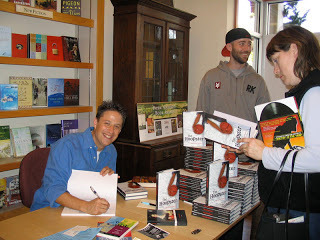 However, sad to say, it seems as if some schools have forgotten this. Not all – and if you have a teacher that tries hard to make learning fun and meaningful and exciting and interesting – consider yourself lucky. Why? Because I'd venture to say that teachers like this eventually end up teaching you a great deal. School is not a comedy club, but it's not a funeral home, either, and I believe that a classroom without laughter is a classroom that is not operating at its highest possible potential. Before kids are students, they are people and people need to laugh much like they need to eat and breathe and love.
However, sad to say, it seems as if some schools have forgotten this. Not all – and if you have a teacher that tries hard to make learning fun and meaningful and exciting and interesting – consider yourself lucky. Why? Because I'd venture to say that teachers like this eventually end up teaching you a great deal. School is not a comedy club, but it's not a funeral home, either, and I believe that a classroom without laughter is a classroom that is not operating at its highest possible potential. Before kids are students, they are people and people need to laugh much like they need to eat and breathe and love.
Just to be clear, I believe that working hard is important. In my classroom, I have little patience for goof-offs but I have a lotta love for kids who put good ol' fashioned positive energy into their efforts. My belief is that you are not enjoying the work, you probably aren't going to learn as much as you would if you were enjoying the work. Plus, you are much more likely to try harder when you care about and enjoy what you are doing. Making reading enjoyable and making writing enjoyable makes better readers and writers.
Fun is my secret sauce. It works!
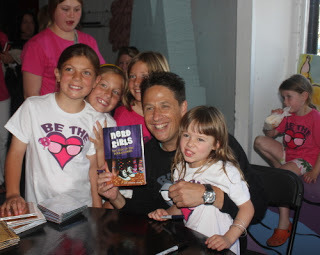 What else can we expect from Nerds Girls beyond this first book?
What else can we expect from Nerds Girls beyond this first book?
There is all kinds of crazy, fun stuff right now. I've built a game. I've created some author videos. There's a Nerd Girls comic.
All free for anyone who wants them.
Of course, there's already Hollywood talk of a movie and a TV show and clothes and merchandise and blah, blah, blah. (www.TheNerdGirlsWorld.com is the home base for information about all of this stuff.)
But for me, it's all about the core material right now. Nerd Girls Book II is on its way and beyond that there are a few more surprises in the works.
All in all, I guess it's just about making sure to have fun, work hard and continue enjoying all the great kids I get to meet who have become fans of my writing. Of course, the teachers and the librarians are great, too, but it's all about the kids. Their approval means the most to me.
And really, how ridiculously lucky am I to have it? As I tell folks all the time, it's quite healthy to channel your inner nerd. That's all I am doing right now. It's good for the soul.
If you missed Part I of my interview with Alan, check it out here.
Links:
Alan's official website: www.AlanSitomer.comNerd Girls books: www.TheNerdGirlsWorld.com Dallas Woodburn
author, speaker, freelance writer
founder of Write On! Books and Write On! For Literacy
www.writeonbooks.org
http://dallaswoodburn.blogspot.com/

Besides being an author, you are an award-winning teacher. How does teaching influence your writing and the creation of your material?
I show all of my books to real kids first. My students, former students, fans I have gotten to know from around the country, they all get to check out my books hot off the press before anyone else gets a chance to see them. That means before my literary agent. That means before my editor. That means before anyone in the adult world who works in "the publishing industry." Real kids are my readers and if they don't like something – if they don't laugh, if they don't cry, if they don't approve – then it doesn't really matter what the adults think.
Kids are my best, and toughest audience. If my books flies with them, then I know I am good and I'll go ahead and take it to the next level and begin to show it to the people in the publishing industry. But if I do not get their seal of approval, I stop, listen to their feedback and go back into the piece to go make it work. It's probably why my fans are so loyal; they know that I respect them and I listen to them and I like them.
Kids who read my books can know that other kids have read them first and given the "Thumbs Up!" sign. I really think that is an important element to my work.

You often talk about "puttin' the fun" in reading, writing and school. Why?
Let's be honest: sometimes school can get SO BORING! And there's no reason for it. But still, grumpy adults sometimes send the message to kids that life is to be serious, serious, serious and humorless, humorless, humorless.
To them I say BLAAAAHHH!
Students are at their best when they are enjoying what they are doing. Students will read more books when they like what they are reading. Students will learn more about a subject when they like what they are learning. Students will try harder to do a good job on the work they are being asked to do if they like the work that they are doing.
That's my belief and I am sticking with it. (Besides, I was named California Teacher of the Year so ya might think I know just a wee little bit about this stuff, huh?)
Of course, there is a time to be serious. But being serious does not mean that you can't enjoy yourself. Of course kids have to realize that there are some things in life you just have to do - and do well - even if they are not "fun." I get that. It's called reality and the bigger point of school is not to be entertaining. But for the most part I've found it's actually quite satisfying to work really, really hard on something that challenges you deeply. Finding the joy in the challenge is what brings out the best in us.
 However, sad to say, it seems as if some schools have forgotten this. Not all – and if you have a teacher that tries hard to make learning fun and meaningful and exciting and interesting – consider yourself lucky. Why? Because I'd venture to say that teachers like this eventually end up teaching you a great deal. School is not a comedy club, but it's not a funeral home, either, and I believe that a classroom without laughter is a classroom that is not operating at its highest possible potential. Before kids are students, they are people and people need to laugh much like they need to eat and breathe and love.
However, sad to say, it seems as if some schools have forgotten this. Not all – and if you have a teacher that tries hard to make learning fun and meaningful and exciting and interesting – consider yourself lucky. Why? Because I'd venture to say that teachers like this eventually end up teaching you a great deal. School is not a comedy club, but it's not a funeral home, either, and I believe that a classroom without laughter is a classroom that is not operating at its highest possible potential. Before kids are students, they are people and people need to laugh much like they need to eat and breathe and love.Just to be clear, I believe that working hard is important. In my classroom, I have little patience for goof-offs but I have a lotta love for kids who put good ol' fashioned positive energy into their efforts. My belief is that you are not enjoying the work, you probably aren't going to learn as much as you would if you were enjoying the work. Plus, you are much more likely to try harder when you care about and enjoy what you are doing. Making reading enjoyable and making writing enjoyable makes better readers and writers.
Fun is my secret sauce. It works!
 What else can we expect from Nerds Girls beyond this first book?
What else can we expect from Nerds Girls beyond this first book?There is all kinds of crazy, fun stuff right now. I've built a game. I've created some author videos. There's a Nerd Girls comic.
All free for anyone who wants them.
Of course, there's already Hollywood talk of a movie and a TV show and clothes and merchandise and blah, blah, blah. (www.TheNerdGirlsWorld.com is the home base for information about all of this stuff.)
But for me, it's all about the core material right now. Nerd Girls Book II is on its way and beyond that there are a few more surprises in the works.
All in all, I guess it's just about making sure to have fun, work hard and continue enjoying all the great kids I get to meet who have become fans of my writing. Of course, the teachers and the librarians are great, too, but it's all about the kids. Their approval means the most to me.
And really, how ridiculously lucky am I to have it? As I tell folks all the time, it's quite healthy to channel your inner nerd. That's all I am doing right now. It's good for the soul.
If you missed Part I of my interview with Alan, check it out here.
Links:
Alan's official website: www.AlanSitomer.comNerd Girls books: www.TheNerdGirlsWorld.com Dallas Woodburn
author, speaker, freelance writer
founder of Write On! Books and Write On! For Literacy
www.writeonbooks.org
http://dallaswoodburn.blogspot.com/
Published on August 09, 2011 05:45
August 8, 2011
Part I: Interview with Alan Sitomer, award-winning author of NERD GIRLS
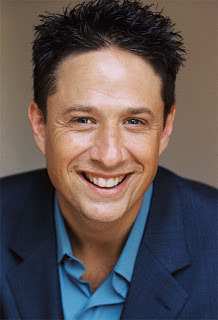 Alan Sitomer is California's 2007 Teacher of the Year. In addition to being an inner-city high school English teacher and former professor in the Graduate School of Education at Loyola Marymount University, Mr. Sitomer is a nationally renowned speaker specializing in engaging reluctant readers who received the 2004 award for Classroom Excellence from the Southern California Teachers of English and the 2003 Teacher of the Year honor from California Literacy. In 2007, Alan was named Educator of the Year by Loyola Marymount University and in 2008 The Insight Education Group named him Innovative Educator of the Year.
Alan Sitomer is California's 2007 Teacher of the Year. In addition to being an inner-city high school English teacher and former professor in the Graduate School of Education at Loyola Marymount University, Mr. Sitomer is a nationally renowned speaker specializing in engaging reluctant readers who received the 2004 award for Classroom Excellence from the Southern California Teachers of English and the 2003 Teacher of the Year honor from California Literacy. In 2007, Alan was named Educator of the Year by Loyola Marymount University and in 2008 The Insight Education Group named him Innovative Educator of the Year.Mr. Sitomer has also authored 11 books to date for esteemed publishers such as Disney, Scholastic, Penguin/Putnam, and RB Education. These include six young adult novels, three children's picture books, two teacher methodology books, and a classroom curriculum series for secondary English Language Arts instruction called The Alan Sitomer BookJam. In the past he's been honored by the American Library Association (the A.L.A. named Homeboyz a Top Ten Book of the Year 2008, receiving the prestigious ALA Quick Pick Recognition for young adult novel which best engages reluctant readers) and within the next 18 months Alan will have four new titles hitting the shelves.
Mr. Sitomer is currently on sabbatical from the classroom as he works to re-shape literacy education through policy dialogue, professional development workshops, and authoring new materials for classroom use. He was kind enough to fit an interview with Write On! into his very busy schedule to talk about his newest release, NERD GIRLS, released last month from Disney books.
Alan, it is truly an honor to have you here today! What inspired you to write Nerd Girls?
There are a variety of reasons why I wrote Nerd Girls. Number one, I'm sorta a dork. I mean, I like reading, I like writing, I like learning about things that interest me and I love teachers and librarians.
Plus, I've been known to embarrass myself now and then. For example, I once gave an oral report in front of an entire class with my fly unzipped. I thought people were laughing at my ingenious use of comedy. Instead they could see my tightie-whities.
Oy vey!
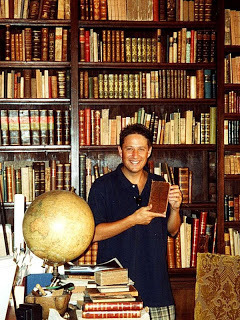 Of course, when I was a kid in school this made my life kinda tough but once I realized that I am what I am the world got a lot easier for me. I wasn't cool, sexy, the class president, or voted most likely to conquer the planet. I was awkward with members of the opposite sex, laughed like a goofball, and there were times when I felt like the loneliest person on the planet.
Of course, when I was a kid in school this made my life kinda tough but once I realized that I am what I am the world got a lot easier for me. I wasn't cool, sexy, the class president, or voted most likely to conquer the planet. I was awkward with members of the opposite sex, laughed like a goofball, and there were times when I felt like the loneliest person on the planet.Add it all up and I was a nerd.
Then I realized, once I got older, that there are more of "us" than there are of "them" anyway so I decided to channel my inner nerd and put some smiles on paper. The result was this book and it's been received really, really well. (Hey, people like to laugh.) I'm very proud of the work and plan to do more.
Nerd Girls is your first comedy. How is writing comedy different than writing in other genres?
Writing comedy is very different in some regards and yet, writing comedy is very much the same as all other genres of writing. For example, when you write action adventure, you have chase scenes where the bad guy hotly pursues the hero in fast paced, breathless action. In comedy, somebody farts. Or bonks their head. Or farts while bonking their head while being hotly pursued by a bad guy in fast paced-breathless action.
As you can see, it's an art.
However, the rules of good writing still apply. You must have a protagonist with a goal who wants something. And that protagonist must have stuff that gets in their way which prevents them from obtaining that which they want.
Stories are all about protagonists taking meaningful journeys. And we love stories so because all of us are taking our own journeys right now. We identify with people who get into trouble, people who have a crush, people who screw up BIG TIME and people who pull a rabbit out of their butt at the very last minute and save the day in a way that proves, "Ya know what, I actually have something good to offer this world after all. So NAH!"
And then they fart and then we smile and then we realize that the characters in the books we read and love are actually our true friends. They are people who understand us, people who inspire us and people who make us realize that doing good things and living in a good way makes us feel good on the inside.
Really, what beats that?
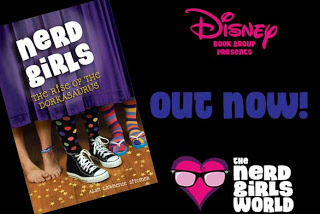
Where did the kooky characters in this book come from?
The first kooky character is probably me. I just love to laugh. Basically, my rule is, if the book doesn't make me laugh, then why in the world should I expect that it's going to make anyone else laugh, either? This means that while I was writing Nerd Girls, I was laughing a lot.
Out loud.
All by myself.
In a room with no other human beings. Just me sitting behind a desk laughing out loud with no one else around.
They lock people up for that kind of stuff.
Also, some parts of the book were written when I was sitting on airplanes on my way to go visit a school and talk with the kids. (I do that a lot.) This means I'm the loony guy chuckling out loud to himself on a crowded airplane where no one else ever gets to see the joke or learns what's so funny.
I'm used to people staring. But hey, whatever works, right?
Of course I draw my inspiration from other people, too. Lots of real people. Real kids especially. Here's a practice test.
1) Think of a dork you know.
2) Now think of that person doing something dorky.
3) Now think of that person doing something dorky while thinking to themselves that what they are doing is not dorky at all but rather totally normal behavior.
That right there is how my characters are born. Some people are just downright funny. I put those people in my books. See… simple.
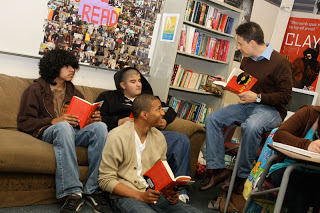 I gotta admit though, I think I was born with a weirdo magnet in my body because kooky, nutty, dorky, oddballs just seem to find me. When I was a kid in middle school, I knew people who smelled their belly button lint. When I went to college, I knew a person that ate their cereal with Coca-Cola instead of milk. Now, as an adult, people who own hairless dogs sit next to me and just start conversations for no reason at all.
I gotta admit though, I think I was born with a weirdo magnet in my body because kooky, nutty, dorky, oddballs just seem to find me. When I was a kid in middle school, I knew people who smelled their belly button lint. When I went to college, I knew a person that ate their cereal with Coca-Cola instead of milk. Now, as an adult, people who own hairless dogs sit next to me and just start conversations for no reason at all.Like I said, it must be a magnet. But when you are a writer, it comes in handy.
Indeed, all of my characters are fiction. But really, they're not. They're just people I know or see or meet with a few name changes. After all, why invent dorks and nerds and doofuses when there are dorks and nerds and doofuses all around us?
In Nerd Girls the good guys win but also, they don't. Why write a book for kids that is layered with complexity like this?
Look, kids today are smart. Wicked smart. And writing neat little sweet stories that wrap up like perfect little fairy tales is hardly the way the real world works.
Now, I don't want to give anything away about the book for those that have not yet read it but are planning to, but twists are important to good books. It's part of the magic that makes them memorable and while I wanted to write an LOL comedy – which I kinda believe I have – I also wanted to make sure today's young readers didn't feel as if I was writing down to them or not respecting their cerebral abilities. Like I said, kids today are smart and sure, they want to laugh, but they also want to be challenged and appreciated for being more intelligent than so many adults often believe they are.
Nerd Girls is layered and complex because today's young people are layered and complex. But today's young people also have a wonderful sense of humor. They love to laugh.
And so do I.
In a way, this laughter is where we all get to meet.
# # #
Check back tomorrow for PART II of my interview with Alan Sitomer!
And in the meantime, for more information about Alan, please visit his official website at www.AlanSitomer.com.Dallas Woodburn
author, speaker, freelance writer
founder of Write On! Books and Write On! For Literacy
www.writeonbooks.org
http://dallaswoodburn.blogspot.com/
Published on August 08, 2011 05:52
August 5, 2011
Interview with Anna Geare
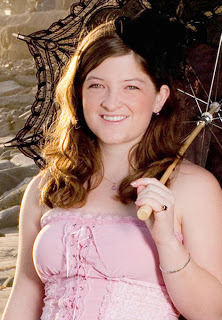 Anna Geare is an 18-year-old recent graduate of Foothill Technology High School in Ventura, California. She has been writing poetry since the 7th grade and is also in love with the theatre -- she has written a one-act play and multiple scenes and monologues for her acting class, and is currently working on her second one-act play. In addition to theatre, she has an interest in science and engineering. At Foothill she was on the school robotics team and is planning to major in chemistry in college. She plans to become a chemical engineer while continuing to be involved in acting and writing.
Anna Geare is an 18-year-old recent graduate of Foothill Technology High School in Ventura, California. She has been writing poetry since the 7th grade and is also in love with the theatre -- she has written a one-act play and multiple scenes and monologues for her acting class, and is currently working on her second one-act play. In addition to theatre, she has an interest in science and engineering. At Foothill she was on the school robotics team and is planning to major in chemistry in college. She plans to become a chemical engineer while continuing to be involved in acting and writing.Anna's poem "Through Open Eyes" is featured in Dancing With The Pen: a collection of today's best youth writing, available on Amazon here.
How did you get your idea for "Through Open Eyes"?
"Through Open Eyes" is a poem about the different problems that the world is facing and how so few people seem to really care or are passionate about helping. They include, among other things: Global Warming, child soldiers in Africa, terrorism, and poverty. I volunteer for a variety of different organizations and grew up with social worker parents. I've become real passionate about helping the world in as many ways as I can. This poem was a way for me to express my message and hopefully inspire others to help the world as well. My personal inspiration for the poem was the Black Eyed Peas' song "Where is the Love?" I wrote my poem with a rhyme scheme and beat that reminds me of rap and comes off as a little angry. I was inspired by the idea and just sat down and wrote a bunch of different couplets, each about a different problem, then rearranged them in a multitude of different ways until it just felt right.
Have you been writing for a long time? What do you like about writing?
I wrote some as a kid, but not much. When I truly took on writing as a hobby was in the 7th grade when we had a huge unit on poetry that I loved. I entered a local poetry contest that year with a poem I wrote entitled "The Color of Peace." I went to the Santa Barbara Writers Conference the summer after 8th grade where I was inspired to pursue writing a bit more. My love of theatre then lead me to playwriting, which seemed to come fairly naturally to me. When I see a story, I naturally see it on the stage. Writing, especially poetry, gives me a way to express myself, but only when I write personally. Then there are times when I write from a view completely different from my own, about things I may have never even experienced. This type of writing attracts me the same way acting does. It gives me an opportunity to take on a character completely different from myself and explore emotions I don't feel on a daily basis. This fascinates me.
What does it mean to you to have your piece included in this book?
When I think about being published in this book, I'm reminded of my first attendance to the Santa Barbara Writers' Conference. I talked to an agent, simply for the experience, knowing very well I was not going to get far with the poems I had written at 13. The agent told me poetry was incredibly hard to get published, and others have also been discouraging. Well, here I am, with a poem published in a book! I was ecstatic when I was notified that my poem was chosen to win honorable mention and be published in Dancing With The Pen.
Do you have any advice for other writers, or for other young people going after their dreams?
Don't give up and don't put your true dreams aside for more "practical" ones. Especially with writing, it's easy to put your more artsy or impractical dreams aside to concentrate on school or related interests. I didn't always spend much time on writing, or even acting for that matter. Science was my more practical interest, so once I got into high school, that pursuit came first. I can tell you that I have never once regretted taking the time to attend a writers conference or write a play, but I do sometimes regret not putting time aside each week to work on my play or write a poem. Life is just going to get more and more busy as you get older. Take advantage of the time you have and follow any dreams you may have.
Can you share a few of your favorite books or authors?
I will give the "cliché" answer of J.K. Rowling and Tolkien. Growing up, those were definitely my favorites as well as Lewis's Chronicles of Narnia. As I've gotten older, I've become a pretty big Ray Bradbury fan. I've had the opportunity to hear him speak at the Santa Barbara Writers Conference a few times, which were priceless experiences. Ishmael Beah's A Long Way Gone has also been a very inspirational book for me. The autobiographical story of a child soldier from Africa is what inspired my senior project to build a school in Sierra Leone, which has lead to my desire to join the Peace Corps after I get my Bachelor's degree.
What inspires you?
Lots of things actually. I have an array of interests, so I find interesting things to write about from many different places. I've written about my family, about problems in the world that interest me, about my emotions, and about experiences I have never had. In fact, the original poem I won Honorable Mention for was not suitable for a book for young students, but was inspired by a random set of words pulled from a magazine. The play I'm currently writing was inspired by a lesson on WWI I learned in school. The world is full of inspiration, it just takes someone to recognize it and write it down.
What are you working on now? What's next for you?
I haven't been working on as much poetry lately, but I have been doing more stage writing. It can be pretty hard finding scenes and monologues for youth to perform, so I've been writing some stuff for my acting class. I just wrote a scene that everyone seemed to love. I'm also trying to work on my one-act play. It's still in the planning stages, but I'm getting pretty close to being ready to write it out.
Links:
Order Dancing With The Pen on Amazon. (It rose to a #2 ranking on Amazon.com in the "literature anthologies" category in its first week of release!Please take a few seconds to "like" our Amazon page!And, if you have a few minutes and could write a review on Amazon, that would be fantastic! You can also follow Dancing With The Pen on Facebook and Twitter. We're now featured on Goodreads, too!Discounted bulk orders are available at the Write On! website: www.writeonbooks.org. Dallas Woodburn
author, speaker, freelance writer
founder of Write On! Books and Write On! For Literacy
www.writeonbooks.org
http://dallaswoodburn.blogspot.com/
Published on August 05, 2011 06:01
August 3, 2011
Interview with Lucia Chen
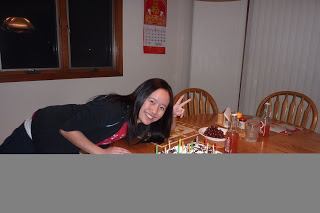
Today we continue our Dancing With The Pen blog tour with an interview with young writer Lucia Chen, whose story "Take My Hand" is featured in the book. Order your copy of Dancing With The Pen: a collection of today's youth writing on Amazon here.
What would you like readers to know about you as an introduction?
My name is Lucia (pronounced Lu-See-Ah…the Spanish way, not the Italian way!) and I'm a 17-year-old girl from Beijing. Now I live in the suburbs of Detroit, where I run cross country, watch soccer matches religiously, and read way too many historical romances. (They're my guilty pleasure!)
Describe your story that were published in Dancing With The Pen. How did you get your idea for the piece? Take us through your writing process.
More often than not, I write what I read. When I wrote my short story Take My Hand, I had been going through a medieval phase, devouring novels about knights and battles and grisly conflicts between the English and the Scots. One day I asked myself, "What if an Englishman and a Scotman became friends…and then were pitted against each other?" The idea just lodged in my brain and refused to leave until it became a full-fledged story.
Have you been writing for a long time? What do you like about writing?
My writing career "officially" began with a memorable 6th grade assignment – a pourquoi story about how the pig got its curly tail. Since then, my pencil (and now, keyboard) has been an extension of my hand. What I love most about writing is that wonderful moment after you sit and stare at a awkward sentence for ages, and then – from out of the blue – you find a word that fits perfectly.
What does it mean to you to have your piece included in this book?
I am ecstatic! Deliriously happy! Eternally grateful! It just means so much to me that people across the nation – perhaps even across the world – are reading and enjoying what I wrote.
Do you have any advice for other writers, or for other young people going after their dreams?
To steal the words of Henry David Thoreau: "Go confidently in the direction of your dreams." A writer's life may be rife with rejection and disappointment, but it is also bursting with satisfaction and success. And if you truly enjoy the act of putting pen to paper, then that is a victory in itself.
Can you share a few of your favorite books or authors?
An absolute favorite of mine (as in, I reread it every few months or so) is Ella Enchanted by Gail Carlson Levine…which says something, because I'm not even a fantasy fan. Just a snapshot of my other favorites: The Juliet Club by Suzanne Harper, The Truth about Forever by Sarah Dessen, The Hunger Games by Suzanne Collins, and Pride and Prejudice (Mr. Darcy!!! Enough said) by the incomparable Jane Austen.
What inspires you?
The World Cup. No, seriously! As K'naan sang in the 2010 World Cup anthem, it's a time when "every nation is around us," when souls from every corner of the world "sing forever young…sing songs underneath the sun." When you think about it, every one of those souls has his or her own story to tell. A world of stories coming together under one sun…there is nothing more inspiring to me than that.
What are you working on now? What's next for you?
Other than really bad poetry and cheesy stories? My first novel, actually! To put it concisely, it's a time-travel romance set in Napoleonic Europe…complete with villainous French agents and hot British spies. ☺ The manuscript is complete and in the editing stages, and I hope to one day publish it.
Anything else you'd like to add?
How about two truths and a lie?
1. I am an excellent seamstress.
2. When I was little, I was allergic to sand.
3. I have a passionate hatred of cheese.
(Just for the record, I can't sew to save my life).
Links:
Order Dancing With The Pen on Amazon. (It rose to a #2 ranking on Amazon.com in the "literature anthologies" category in its first week of release!Please take a few seconds to "like" our Amazon page!And, if you have a few minutes and could write a review on Amazon, that would be fantastic! You can also follow Dancing With The Pen on Facebook and Twitter. We're now featured on Goodreads, too!Discounted bulk orders are available at the Write On! website: www.writeonbooks.org. Dallas Woodburn
author, speaker, freelance writer
founder of Write On! Books and Write On! For Literacy
www.writeonbooks.org
http://dallaswoodburn.blogspot.com/
Published on August 03, 2011 06:37
August 1, 2011
Summer Writing Camp a Great Success!
The first weekend of Summer Writing Camp was a huge success! I feel so privileged to work with such amazing, talented, imaginative young writers. They inspire me to no end with their creativity and, even more important, their respect and kindness to each other. Here are some pictures:
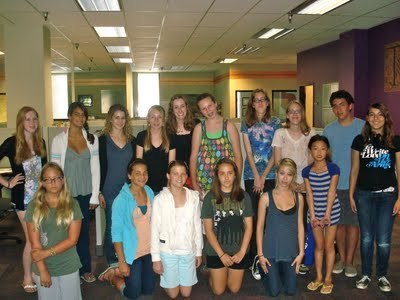 The wonderful morning session
The wonderful morning session
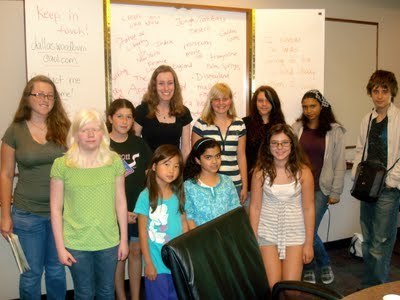 The delightful afternoon session.
The delightful afternoon session.
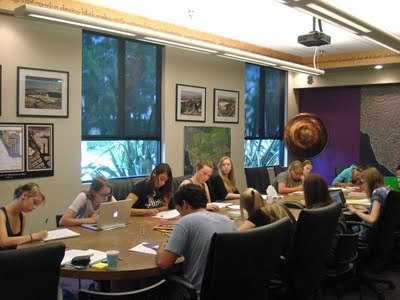
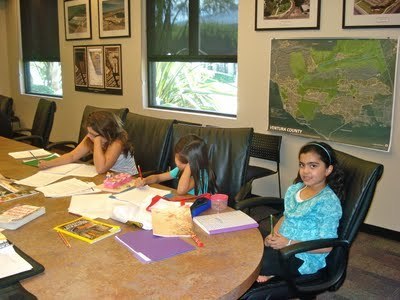
Camp will be held next weekend as well -- there are still spots available if any young writers in the Ventura County area would like to join us! Learn more at www.writeonbooks.org/festivalofwriting.aspx.Dallas Woodburn
author, speaker, freelance writer
founder of Write On! Books and Write On! For Literacy
www.writeonbooks.org
http://dallaswoodburn.blogspot.com/
 The wonderful morning session
The wonderful morning session
 The delightful afternoon session.
The delightful afternoon session.


Camp will be held next weekend as well -- there are still spots available if any young writers in the Ventura County area would like to join us! Learn more at www.writeonbooks.org/festivalofwriting.aspx.Dallas Woodburn
author, speaker, freelance writer
founder of Write On! Books and Write On! For Literacy
www.writeonbooks.org
http://dallaswoodburn.blogspot.com/
Published on August 01, 2011 12:37
July 31, 2011
Interview with debut YA author Emily Hendricks Jensen
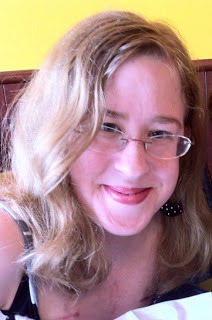 Emily, thank you so much for being a guest on the blog today! What would you like readers to know about you as an introduction?
Emily, thank you so much for being a guest on the blog today! What would you like readers to know about you as an introduction?I have a pretty uninteresting bio. I was born in Missouri and was an only child until I was 12 and now I have 8 siblings (halves and steps.) I majored in Journalism and I loved it, though I don't use the degree in the conventional sense of working for a newspaper. I do, however, use all the courses I took on researching and investigating to find information for my writing. I moved to Wyoming in mid-July and will be getting married in mid-August. I'm already writing under my future married name. I love that.
Tell us about Fault. What was your inspiration/motivation behind this book?
The plot came from a writing prompt I saw on a website when I was in high school. It was started it as a short story, but before I knew it I had written one young adult novel that I eventually split up into five different novellas. The story is about Cecelia, a 15 year old drug addict who will do anything for acceptance, love and drugs. Her parents send her to a facility to help her with her drug problems, but they won't acknowledge the abuse she had in her past that started all of her drug problems in the first place. It is written in verse.
What have you learned through writing this book?
How cathartic writing can really be and the what all the things you write can tell you about yourself as a person. I didn't realize how much of myself I poured into the story until my fiance told me he saw certain people in the characters. I'm not a drug addict and I've never been to a rehabilitation facility, but I'm the only child of a bitter divorce and I understand what it feels like to be shuttled from house to house. I know what trying too hard to be perfect feels like.
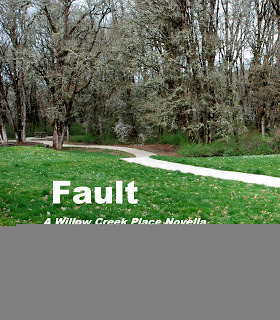 How did you get started writing?
How did you get started writing?I've always been some sort of writer. Short stories when I was younger, then poems (that were awful) in high school. I never had the confidence to write a book, but one day I sat down and started one. Finished that one, tried to get an agent. Didn't happen. Tried again with my second book. Nothing. At first I felt like a terrible writer, then I realized that those two books were absolutely not my best pieces of work. After that I wrote Fault. I sent it around to agents and small presses, and everyone who read it "loved the concept" but said it would be a hard book to market. That is why I went through the self-publishing process.
What is your writing process like? Do you write on a computer? In a spiral notebook? Do you draw illustrations?
I write everything on either my computer or my iPhone. I do a lot of traveling (both in the US and internationally) and I think I do my best work on planes and trains. My books don't have illustrations, probably because I can barely draw a stick figure.
How do you get ideas for what you write?
Mostly the news. I'm a huge news junkie, especially entertainment news.
What is your biggest advice for young people reaching for their dreams?
Never ever give up. I know that's what everyone says, but it's so true. If you give up, all you will have is regrets and regrets get you nowhere.
What are some of your favorite books?
My two favorite books ever are The Saving Graces by Patricia Gaffney and Wish You Well by David Baldacci. I also love anything by Ellen Hopkins, Melissa Senate, and Maureen Johnson.
Is there anything else you would like to add?
I am so excited about my novella series! A new novella will come out every two months. Next summer I intend to publish a full length young adult novel. I have other things in the works as well, so stay tuned!
Contact Emily:
Website: http://www.emilyhendricksjensen.com/Facebook: http://www.facebook.com/EmilyHendricksJensenDallas Woodburn
author, speaker, freelance writer
founder of Write On! Books and Write On! For Literacy
www.writeonbooks.org
http://dallaswoodburn.blogspot.com/
Published on July 31, 2011 09:41
July 29, 2011
Guest Post by Barbara Jolie
Outlining to Move Your Story Forwardby Barbara Jolie
Ever since high school, I've dreamed of writing a teen fiction book that would excite and inspire young people as much as my favorite authors excited and inspired me. Before, during and after college, I started the book numerous times and had even gotten several chapters deep before losing focus and giving up only to start over again.
After speaking with other writers, I think I've finally figured out why I'm having trouble keeping my book on track: I lack an outline. Like trying to reach a destination without a map, writing a book without an outline can lead to writing that meanders and rambles in a stream of consciousness and never forms a coherent whole. I've decided that before my next attempt at my book, my first step will be to write an outline, and I'm in the middle of that process right now. Here's what I've learned about the outlining process so far.
1. Outlines Are Adaptable
I used to be afraid of outlines because I thought using them would box me in to a formulaic, pre-packaged storyline with no room for my own creative liberties. In reality, all an outline is doing is keeping me walking forward in a straight line with my book. In the past, I've known how I want my story to begin, I've known how I want it to end, and I've known the key conflicts that must take place, but so far I have had trouble putting them all together into a whole. With an outline, how the characters "get there" is up to me, but I do know I have certain chapters that I must devote to arriving at the conflicts, dealing with them, and overcoming them if I'm to write a good book. I can change and adapt my outline all I want to suit the changing whims of my mind, as long as I still stay on track and push the story forward.
2. Outlines Give You More Manageable Goals
Writing an entire book is an intimidating task, but breaking it down into outline form section by section and then chapter by chapter gives you more manageable goals for writing your book. Establishing that I'm going to finish this book in a year may or may not get me there. But by establishing a set number of chapters in my outline that I will finish each month, I have given myself a more do-able goal, and a step-by-step plan for completing the entire work.
3. Outlining Is an Opportunity for Brainstorming
While creating my outline, I've started asking myself questions like, "Ok, so how does the main character actually GET herself in this tough situation?" and "Does it actually make sense for her to make that climactic decision, given her personality and past behavior?" The outlining process has forced me to get creative in the way I push my story forward and has led me to flesh out my characters in greater detail based on the major events in their lives and how they respond to them. So the outlining process is actually leading to a better overall book!
Has outlining helped you in the past? How could it help your writing process in the future?
* * *
By-line: This guest post was contributed by Barbara Jolie, who writes for online classes. She welcomes your comments at her email: barbara.jolie876@gmail.com.Dallas Woodburn
author, speaker, freelance writer
founder of Write On! Books and Write On! For Literacy
www.writeonbooks.org
http://dallaswoodburn.blogspot.com/
Published on July 29, 2011 08:08

